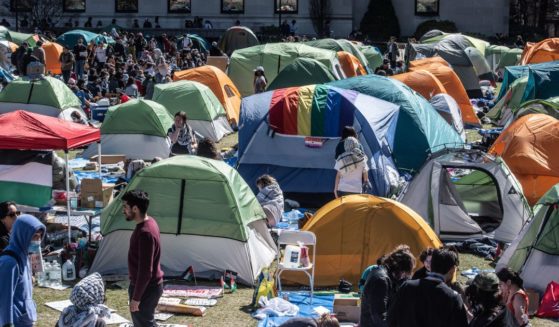CRT Is Doing to America's Culture What Marxism Did to Venezuela's Economy - But There Is Hope
If you follow the news, popular culture or even the president of the United States, you might believe that America is “systemically” racist.
All of us, we are told, encounter racism daily, as victims or as beneficiaries of a racist system. Racism is why you are forced to sit in traffic. Racism is why you were denied a home loan.
The last time you last walked into a store alongside someone of a different race, racism is why you were greeted first. Or second. Either way, racism. That white stranger who rolled her eyes at you when you motioned for her to move out of your way? Racism.
People who see racism everywhere miss that racist attitudes are at an all-time low and that Americans are among the least racist people on earth. They focus instead on racial disparities as though disparate outcomes imply disparate treatment. They do not.
Consider income. Some groups earn more than others, on average. Does this suggest “systemic” discrimination? Not necessarily. As Thomas Sowell has demonstrated, some groups are older than others, on average, and earnings typically increase with age. Why should we expect Japanese (median age over 40) and Mexican (median age under 30) Americans to have similar incomes? Where does racism enter this picture?
The white-black median age gap is smaller (44 vs. 35) but hardly trivial. At 58, the most common (modal) age for white Americans coincides with the age of peak lifetime earnings. At 27, the most common age for black Americans is far from it. It can be added that 18 groups earn more than white people, on average, including Nigerian-Americans.
None of this is to deny the contemporary relevance of past oppression. Moreover, present-day discrimination could contribute to the racial income gap. But the gap itself provides no evidence of this.
How about systemic racism in the criminal justice system? Black people are 2.5 times more likely than white people to be killed by the police and are 5 times more likely to be incarcerated. This gap is troubling, but is it caused by racism?
Consider that black people are disproportionately more likely than white people to commit “serious nonfatal violent crimes” and homicide. The claim that disparities are evidence of systemic racism doesn’t work here on its own terms.
Black Lives Matter characterizes black communities as “overpoliced”; however, black people between the ages of 10 and 34 are 13 times more likely than white people to be murdered. Predictably, withdrawing police protection from black neighborhoods is killing black people. If defunding the police is “pro-black,” surely withdrawing American troops from Afghanistan was “pro-Afghan.”
If black lives mattered more, the policing disparity would be larger.
What about education; specifically, racial disparities in college admissions? Racial discrimination is widespread here, but it runs in the opposite direction. White people and Asians are overrepresented despite institutional discrimination (affirmative action) against them and in favor of other groups. Systemic racism claims again fall flat.
Why then are such claims ubiquitous? Clearly, part of the answer is that the disparate outcomes claim seems intuitive. Part of the answer is that, historically, racism was institutional in American society and its effects remain despite our best efforts.
In this context, it is more socially acceptable to attribute disparities to “the system” than to suggest either that disparities aren’t what they appear to be or that they have behavioral causes (“victim-blaming”). The systemic racism charge also deflects attention from policy failures and from questions like, “Who governs all of these impoverished and crime-ridden places?”
It is striking that each of these answers could have been given 20 years ago, yet the systemic racism indictment has only now become widespread. To understand why, we turn to critical race theory, a radical ideology that recently spread from the academy to the major institutions of American society.
As Carol Swain and I discuss in our new book, “Black Eye for America: How Critical Race Theory Is Burning Down the House,” CRT constructs an all-encompassing narrative of racial oppression.
It borrows from Marxism a vision of society defined by group dominance but with racial groups now substituting for economic classes. CRT casts racial oppression as defining the American system and so demands revolutionary action to overthrow that system. To view racial disparities through this distorted lens is to see racism literally everywhere.
CRT in practice — as implemented in K-12 schools and in workplace diversity training — demeans designated “oppressor” and “oppressed” groups alike. White people are harassed and compelled to admit culpability for crimes they never committed. Black people and other minorities are infantilized (e.g., “math is racist” and hard work is a “white value”) and encouraged to resent their country and countrymen.
If American race relations are bleak, it is because the Marxist paradigm is doing for American society, culture and politics what it did for Venezuela’s economy.
But all is not lost. We can reforge our fractured nation if patriots have the courage to speak the truth in defense of American principles. And the truth is this: America is not systemically racist. Racism was never a founding value of our republic. It was always antithetical to our purpose and creed, and it remains so today.
We must be willing to challenge faulty reasoning and poisonous narratives regardless of the consequences. I won’t trivialize the costs of being “canceled” by the woke mob and its corporate allies except to say that past generations of Americans endured worse to defend our country. This is the challenge of our time, and we must rise to it.
The views expressed in this opinion article are those of their author and are not necessarily either shared or endorsed by the owners of this website. If you are interested in contributing an Op-Ed to The Western Journal, you can learn about our submission guidelines and process here.
Truth and Accuracy
We are committed to truth and accuracy in all of our journalism. Read our editorial standards.












